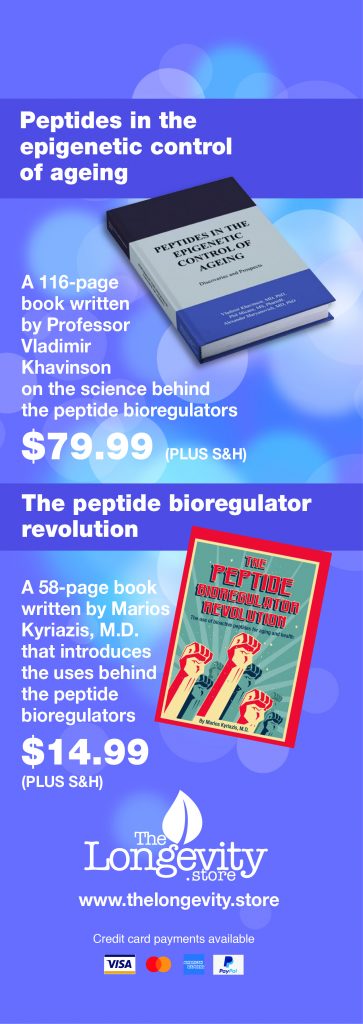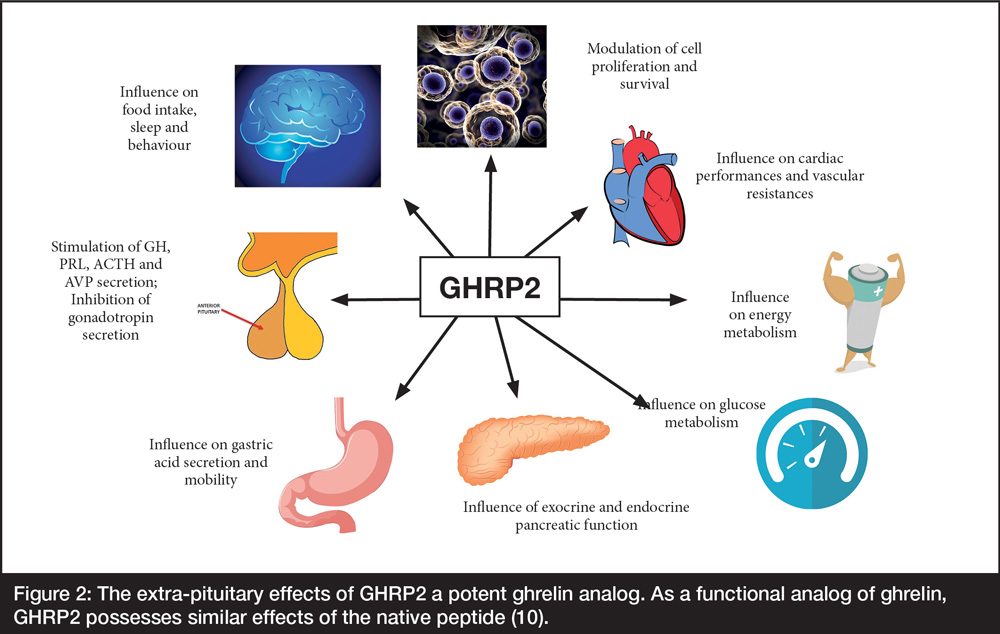
Peptide bioregulators in sports and space
January 8th, 2021An interview with Professor Vladimir Khavinson
Professor Khavinson is the Director of the Saint Petersburg Institute of Bioregulation and Gerontology, Vice President of the Gerontological Society of the Russian Academy of Sciences, Head of Gerontology and Geriatrics at the Mechnikov State Medical University, Chief of the Department of the Pavlov Institute of Physiology. He is a specialist in gerontology and geriatrics and a Doctor of Medical Sciences and the former European Chair of the International Association of Gerontology and Geriatrics (2011-2015).
The following interview was conducted with VK (Professor Khavinson) by PM (Phil Micans).
PM: “Professor Khavinson, thank you very much for taking your valuable time today to talk about how peptide bioregulators are being utilized in sports and even in space.”
VK: “My pleasure Phil, after many decades of research, it is pleasing to see others taking an interest in our work.”
PM: “We have talked about the peptide bioregulators before, and we have highlighted your research and your many published papers. But, just in case there are people reading this for the first time and are unaware of the background, do you think you could please sum up the importance of your findings in a few words?”
VK: “Certainly, to distill everything down to simplicity, after many years of intense studies, we found that short-chain peptides, these are aminoacids from 2 to 6 in length -that can be found in foodstuffs- act as gene switches and they can be used orally since they survive stomach degradation. They can activate, or silence specific genes very accurately. Therefore, we gave them the name of peptide bioregulators as they can ‘perform’ in both directions. So, they can now be used as tools to improve hormonal and tissue reactions; they can be thought of as the epigenetic control in aging.”
PM: “Which reminds me that we have worked on a scientific book together titled peptides in the epigenetic control of aging.”
VK: “A very nice book Phil and you have also created another nice book for the public called the peptide bioregulator revolution.”
PM: “So Professor Khavinson, what is the background of using peptide bioregulators in sports and athletics in Russia?”
VK: “The history is a very long one, it all started in 1980 when the Olympic team took our peptides. We had other sports people too, from soccer players, to tennis and track and field athletes.”
PM: “Why did they use them?”
VK: “Firstly, it was for rehabilitation, especially when taken before championships and major competitions and afterward they took them for restoration. It was for a restoration of health, and fundamentally it was a restoration of protein synthesis. This is of paramount importance to sports people.”
PM: “How is this protein synthesis possible?”
VK: “The peptide bioregulators act on the genes that regulate protein synthesis. And protein synthesis promotes good function in a step-by-step process.”
PM: “Have there been any side-effects with this process?”
VK: “Absolutely none, the peptide bioregulator quantity is low, but they are also completely natural and found in our food. Typically, these peptide bioregulators are made up of 2, 3, 4 aminoacids and they act as keys for interaction and regulation for specific genes. So, for example, the heart peptide bioregulator will interact with only genes associated with the heart and so on.”
PM: “I see, and what about sports people, what kinds of peptide bioregulators favor them?”
VK: “Quite a few actually, in our experience, it is heart, brain and cartilage. In fact, the best effects were from a combination of 6 peptide bioregulators, those being blood vessels, brain, thymus, cartilage, heart, and liver. This combination was recommended and used after a lot of scientific work.”
PM: “Were there any other groups who were recommended this protocol?”
VK: “Yes, they were also used by Cosmonauts too and elite military forces, including submariners. We even helped people who were at the Chernobyl disaster with them. But I want to emphasize that the best results were always when the peptide bioregulators were used in combination. After all, health is not derived from one organ. Today, we can say that we have 40 years of both investigation and application.”
PM: “Very interesting Professor Khavinson, may I ask if there was any use recorded in normal people, I mean civilians undertaking regular jobs?”
VK: “Yes, we had a long-term study of people working in factories. It was a large company called GAZPROM, responsible for the country’s gas supply. The participants worked in Siberia, which as you know is a harsh climate. We had 11,000 people in our study.”
PM: “Professor Khavinson- did you just say there were eleven thousand people in your study?”
VK: “Yes.”
PM: “That’s incredible! Please continue.”
VK: “3000 of the 11,000 were the control group, the remainder were divided into different groups using the blood vessel, thymus and pineal peptides, or combinations of them. We found that in the peptide bioregulator groups there was less ill health and morbidity compared to the control group, in fact it was 2.8 times less. It is a massive difference, to be nearly 3 times less likely to be ill.”
PM: “How old were the individuals in this trial?”
VK: “As they were all workers, they were aged from 35 to 60 years old.”
PM: “Did you try this kind of experiment again elsewhere?”
VK: “Indeed, we worked at the time with the largest manufacture of vehicles in the Soviet Union, and here our results were 2.5 times less illness and morbidity in the peptide bioregulator treated group compared to the controls, it was a similar and conformity result.”
PM: “So you have shown that these peptide bioregulators benefit persons who work in extreme conditions and sports people too. Do you think that the new kinds of pressure jobs, such as those in corporate and banking etc., can benefit from the same technology?”
VK: “Absolutely, if you have chronic stress then taking a combination every month and perhaps repeating every 3 months, maybe even every 6 months can be very beneficial.”
PM: “So unlike, let us say vitamins, or even hormones, there’s no need to take the peptide bioregulators every single day.”
VK: “That is correct Phil. We can switch on, or silence particular genes and those effects can last some time. Of course, it depends on your age/ state of health, those in a bad condition need to be more regular than those in poor condition etc.”
PM: “One particular peptide that stands out to me, that could interest a lot of sports people is the muscle peptide bioregulator. Could you say a few words about it please?”
VK: “The muscle peptide bioregulator interacts with genes that are responsible for the fiber development growth in muscles. It is a unique food supplement, as I have said before, all these peptide bioregulators can be found in food, these extracts are of course stronger and precise, but they all help to explain epigenetics.”
PM: “Can the muscle peptide assist persons with sarcopenia?” [muscle wastage]
VK: “Yes, but it is better for that disorder to use a combination, that’s the muscle peptide, plus thymus, cartilage, pineal and perhaps also the blood vessels. It may sound like a lot, but approaching a significant problem like sarcopenia needs a multi-faceted approach for the best possible outcome.”
PM: “And moving away from disorders themselves, what about that age-old issue of physical energy? Which peptide do you recommend?”
VK: “I think this one belongs to the adrenal peptide bioregulator. Helping to support the numerous hormones that the adrenal produces is vital. Adrenal fatigue is a common problem that many people experience, usually resulting in sleep naps during the day. If we think that adrenal hormones like DHEA are the most common in blood, then their loss, which occurs with age, is well worth supporting naturally with the adrenal peptide bioregulator.”
PM: “Now you said earlier Professor Khavinson, that these peptides don’t need to be taken every day, that’s quite different to a hormone replacement program, where they are likely to be taken every day. Also, on a hormone replacement program one needs to be careful to avoid receptor downregulation, so if it were undertaken without proper controls, i.e. blood tests, it can lead to a permanent need for a particular hormone. How do the peptide bioregulators differ in this regard?”
VK: “Very nice question Phil. Our 40-years of experience in many thousands of patients shows us that the safety of peptide bioregulators is second-to-none. As gene switches, either the gene is on, or it is off, there is no middle ground. We gave these peptides the name ‘bioregulators’- why? Because they regulate in both directions. For example, if a patient is hypothyroid then the thyroid peptide bioregulator will encourage the thyroid to produce more thyroid hormones, but if a patient is hyperthyroid, it will not do so. Peptide bioregulators cannot induce supralogical doses of hormones, which could be the case in an unmonitored hormone supplement program.”
PM: “So I suppose, we have reached that point, to ask if you can please tell us how a sports person should dose with the peptide bioregulators?”
VK: “Athletes can use the bioregulators during training, this can be 2-capsules of each that has been chosen for them for 10-days every month. But a month before a competition they usually increase the dosing to 2-capsules every day. But many will stop 2 to 3 weeks or so before the event and then wait about 2 to 3 weeks after the competition to start again.”
PM: “I do recall one of your fascinating lectures about the Russian girls’ gymnastic team, these were the girls who won Gold at the 2012 London Olympics. I understand they were tested and had unbelievably short telomeres! How did that happen?”
[Just a little background here for our readers, telomeres are the caps at the ends of chromosomes that hold the DNA together. Longer telomeres have been linked with longevity and generally better condition and activity. Today, telomere tests can determine a biological age referred to as ‘teloage.’ One expects telomeres to shorten with aging and in persons with health issues. One does not expect to find short telomeres in extremely fit 20-something year old’s!]
VK: “It is true that telomere length can vary from individual to individual, despite their age. Of course, we can consider that too much or too little of virtually anything can be damaging. There is an argument that athletes at this level are over-exercising, resulting in certain damages. These damages may not play out for many years to come, accordingly there are evidence that athletes do not live as long as the society average. This is all related to excessive stress and extreme/ continuous exercise is an excessive stress. Thus, telomeres are a marker of stress and of aging. These 20-year old girls had telomeres as short as the average 40-year old person. We were so surprised we repeated this investigation, but we had the same results.”
PM: “Fascinating, what was the result after the use of the peptide bioregulators on their telomere length?”
VK: “We saw a normalization of their telomeres for their age. This was a significant improvement, because of course these girls are only 20-years of age.”
PM: “That’s a great elongation. Do you think it is possible for older adults?”
VK: “I do think so, mainly because we have recently released a new publication that shows the normalization of telomeres in middle-aged people with our peptides. Plus, we are working with Dr. Bill Lawrence from the USA and we hope to publish on his results of a three-year study in the middle of 2021.”
PM: “Is there a peptide bioregulator that stands out in regard to telomere normalization?”
VK: “As stated before, a combination of our peptides is always better, but the pineal bioregulator peptide, that is Endoluten® or Epitalon® are fundamental in this regard.”
PM: “Professor Khavinson, I’ve said this before, but I thank you for this amazing research. I think it is now beginning to filter down in the west, (at least by those on the forefront of health), just how important this technology is and that its precision to target an individual’s weak spots, without interfering with other aspects of their biochemistry is truly remarkable. We here at IAS will continue to monitor it and report back on all the findings, and I am especially excited to report on Dr. Lawrence’s patients next year. Professor Khavinson, I know how much of a busy man you are, so I thank you very much for finding the time to talk to us.”
VK: “Thank you Phil.”









